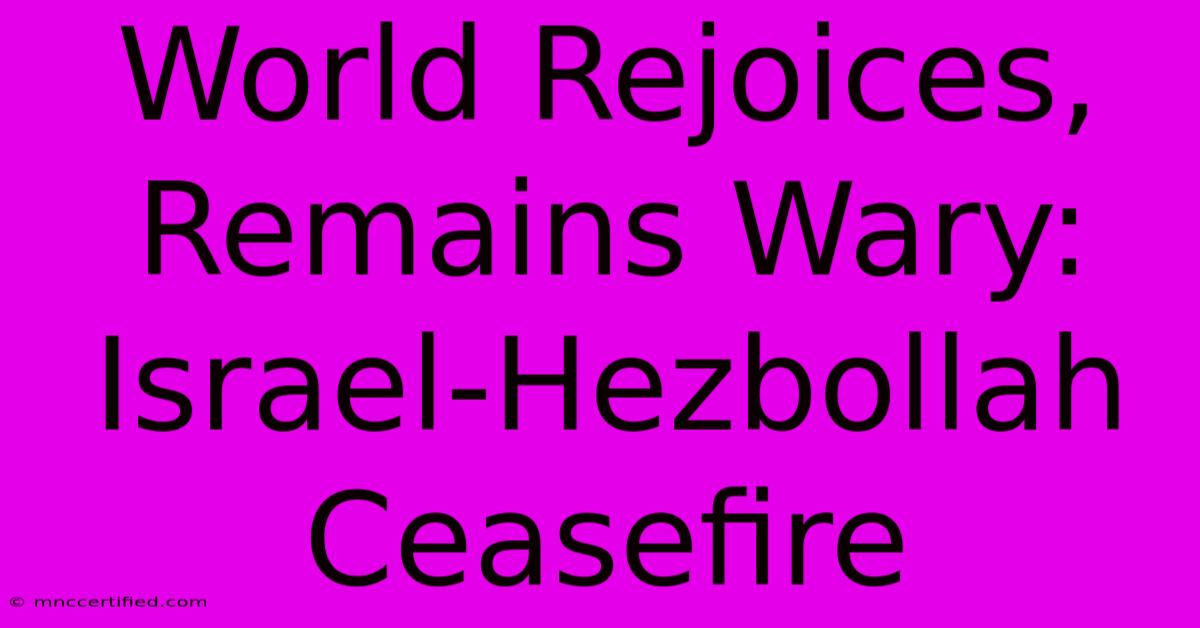World Rejoices, Remains Wary: Israel-Hezbollah Ceasefire

Table of Contents
World Rejoices, Remains Wary: Israel-Hezbollah Ceasefire
The recent ceasefire between Israel and Hezbollah has brought a tentative end to a period of intense conflict, sparking a mixture of relief and apprehension globally. While the immediate cessation of hostilities is undoubtedly welcome news, underlying tensions and unresolved issues cast a long shadow over any celebrations. This article will delve into the complexities of this fragile peace, examining the factors that led to the ceasefire, the lingering concerns, and the potential implications for the future stability of the region.
A Brief Overview of the Conflict
The conflict, which erupted [insert date and brief description of triggering event], saw a dramatic escalation of violence. Israel launched airstrikes targeting Hezbollah infrastructure and operatives, while Hezbollah responded with a barrage of rockets aimed at Israeli civilian centers. The resulting casualties on both sides fueled a cycle of escalation, raising fears of a wider regional conflict.
Key Players and Their Motivations
Understanding the motivations of the key players is crucial to grasping the complexities of the situation. Israel aimed to degrade Hezbollah's military capabilities and prevent further attacks. Hezbollah, backed by Iran, sought to demonstrate its strength and retaliate for perceived Israeli aggression, potentially aiming to achieve broader geopolitical goals. The involvement of external actors like Iran adds another layer of complexity, increasing the stakes and the potential for miscalculation.
The Ceasefire: A Fragile Peace?
The ceasefire, brokered by [mention mediating parties if any], is far from a permanent solution. It's more accurately described as a temporary pause in hostilities, leaving many critical issues unresolved. The lack of a clear and comprehensive agreement on long-term security arrangements casts doubt on its sustainability. Many observers express concern that the underlying causes of the conflict remain unaddressed, paving the way for future eruptions.
Lingering Concerns and Unresolved Issues
Several key concerns remain:
- Hezbollah's arsenal: The size and location of Hezbollah's vast arsenal of rockets remain a significant threat to Israeli security. The ceasefire doesn't address this issue directly.
- Iranian influence: Iran's continued support for Hezbollah fuels instability in the region. A comprehensive solution requires addressing Iran's regional ambitions.
- Palestinian issue: The ongoing Israeli-Palestinian conflict serves as a constant source of tension, which could easily reignite the conflict between Israel and Hezbollah.
- Humanitarian crisis: The conflict caused significant humanitarian suffering, with numerous casualties and widespread destruction of infrastructure. The long-term recovery process poses considerable challenges.
Global Reactions: Relief and Wariness
The international community has reacted to the ceasefire with a mixture of relief and apprehension. Many nations welcome the cessation of hostilities, emphasizing the importance of de-escalation and dialogue. However, concerns remain about the fragility of the peace and the potential for future escalation. The international community's role in fostering lasting peace and stability in the region will be paramount.
The Path Forward: Towards Lasting Peace?
Achieving a lasting peace requires a multi-faceted approach:
- Addressing the root causes of the conflict: This includes tackling issues like the ongoing Israeli-Palestinian conflict, Iran's regional influence, and the arms race in the region.
- Strengthening international cooperation: Enhanced coordination among regional and international actors is essential for enforcing the ceasefire and promoting dialogue.
- Focusing on long-term security arrangements: Negotiating comprehensive security agreements that address the concerns of all parties is crucial for building lasting peace.
- Prioritizing humanitarian aid: Providing substantial humanitarian assistance is vital for the recovery and reconstruction of affected areas.
The ceasefire between Israel and Hezbollah offers a glimmer of hope, but it's a fragile peace at best. The world rejoices in the immediate cessation of hostilities, but remains wary of the numerous challenges that lie ahead in the quest for lasting peace and stability in the volatile region. The international community must play a proactive role in fostering dialogue, addressing the root causes of the conflict, and building a sustainable framework for peaceful coexistence. Only through concerted efforts can a lasting peace be achieved, preventing future escalations and ensuring the safety and security of all involved.

Thank you for visiting our website wich cover about World Rejoices, Remains Wary: Israel-Hezbollah Ceasefire. We hope the information provided has been useful to you. Feel free to contact us if you have any questions or need further assistance. See you next time and dont miss to bookmark.
Featured Posts
-
Private Equity Investment Memo
Nov 28, 2024
-
Mishal Husain Exits Bbc After 26 Years
Nov 28, 2024
-
Lana Del Rey 2025 Tour Dates Tickets Prices
Nov 28, 2024
-
New Contract Sought Newark Airport Rally
Nov 28, 2024
-
Newark Airport Workers Rally For Better Pay
Nov 28, 2024